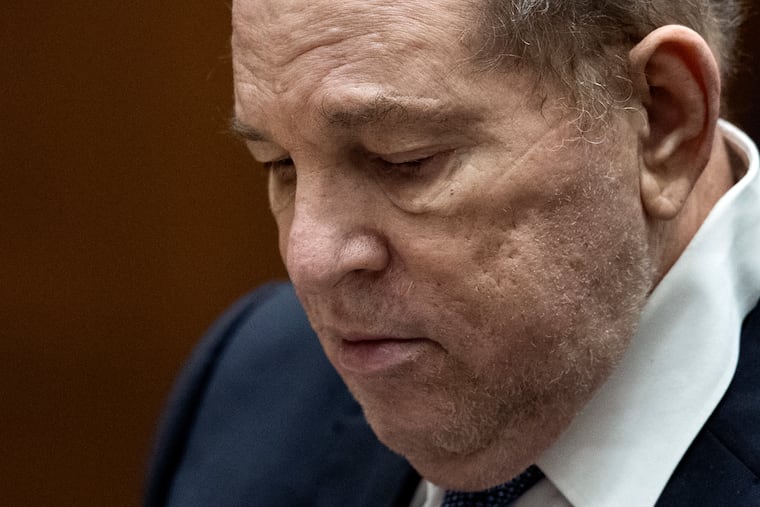Harvey Weinstein verdict is devastating for all survivors
The overturning of his 2020 conviction should serve as a wake-up call to examine the way our justice system treats survivors of sexual violence.

As a sexual assault nurse examiner in Philadelphia, the Thursday decision by the New York Court of Appeals to overturn Hollywood producer Harvey Weinstein’s 2020 rape conviction strikes a deeply personal chord.
This ruling will not only send shock waves through the survivor community, it will also serve as a wake-up call for our city — and the entire nation — to examine the way our justice system treats survivors of sexual violence.
» READ MORE: Harvey Weinstein’s 2020 rape conviction overturned by New York appeals court
Throughout my career, I have witnessed firsthand the challenges survivors face when seeking justice. The fear of re-traumatization or victim-blaming, and the daunting prospect of navigating a complex legal process, often deter many from coming forward. The overturning of Weinstein’s conviction only reinforces these fears and may discourage future survivors in Philadelphia and beyond from seeking the justice they deserve.
Survivors are watching the Weinstein case closely. While the initial victory — and the #MeToo movement the accusations against Weinstein inspired — may have given them hope that justice can be possible, that hope has been dashed by the latest verdict.
Survivors are watching the Weinstein case closely.
The recent decision also serves as a stark reminder that survivors are often casualties of a system that was not built to properly support them.
In the ruling, Judge Jenny Rivera said the 2020 verdict should be overturned because the court had allowed women to testify about additional allegations that weren’t part of the charges and had subjected Weinstein to cross-examination. In a 4-3 decision, the court ruled that the errors were grave enough to warrant a new trial.
For survivors, the prospect of having to relive their trauma and testify once again in a new trial is an incredibly daunting and emotionally taxing experience. The overturning of Weinstein’s conviction sends a disheartening message that even when survivors find the courage to speak out and a jury finds their abuser guilty, their voices can still be silenced, and their experiences called into question. Even years later, even after it seemed like the hard part was over.
In other words, it’s never over.
Philadelphia is no stranger to cases of sexual abuse and the challenges survivors face when seeking justice. The city has grappled with high-profile cases, such as the trial of Bill Cosby, which highlighted the difficulties survivors encounter when coming forward, and the need for a more trauma-informed approach within our legal system.
As a city, we must take this opportunity to reflect on how we can better support survivors and create a justice system that prioritizes their well-being. This includes strengthening partnerships between law enforcement, advocacy groups, and support services to provide comprehensive assistance to survivors throughout the legal process. It also involves implementing mandatory, trauma-informed training for Philadelphia’s law enforcement, prosecutors, and judges handling cases of sexual violence.
To avoid a similar issue overturning future prosecutions in our city, we must work with state legislators to establish clear guidelines for the admissibility of evidence related to an accused’s past sexual misconduct to ensure fair trials, while acknowledging the relevance of such information. Finally, we need to consider enhancing protections against retaliation (such as defamation lawsuits against survivors who speak up) and ensuring survivor privacy to encourage reporting of sexual violence in our communities.
The overturning of Weinstein’s conviction is a painful reminder that our justice system still has a long way to go in supporting and believing survivors. However, it is also a call to action for Philadelphia and communities across the nation to advocate for change, demand accountability, and create a society where survivors feel empowered to speak their truth without fear of retribution or re-traumatization.
Philadelphia has the opportunity to lead by example and demonstrate its commitment to supporting survivors. By creating a more compassionate, trauma-informed approach to handling cases of sexual violence, we can send a message that our city stands with survivors and is dedicated to pursuing justice on their behalf.
Laura Sinko is a sexual assault nurse examiner at the Philadelphia Sexual Assault Response Center and an assistant professor in the nursing department at the Temple University College of Public Health, with research expertise on survivor healing after sexual violence. She is also the director of research and evaluation at Our Wave, an online story-sharing platform for survivors of sexual harm.